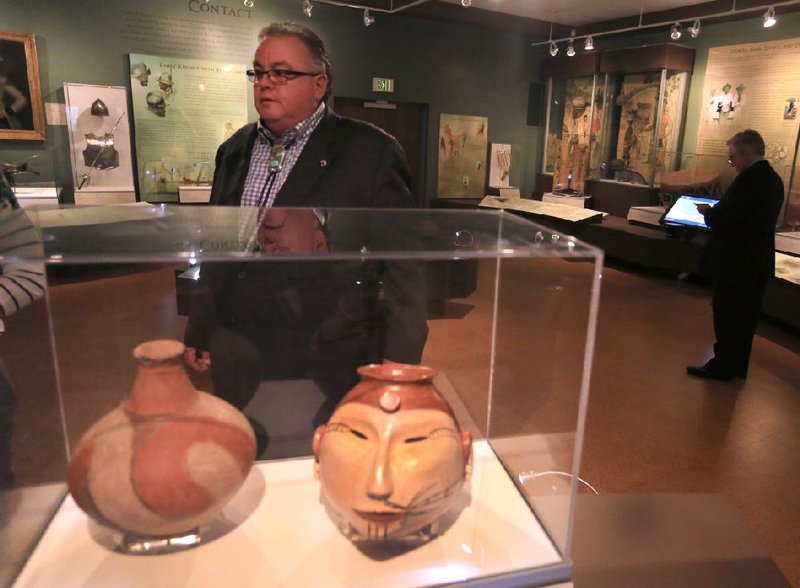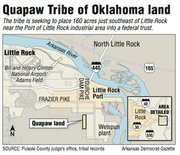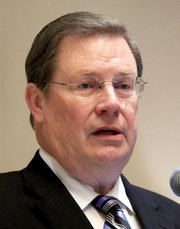The Quapaw Tribe of Oklahoma's chairman is willing to sign an agreement stating that the tribe will not build a casino on the property it owns in Pulaski County if it's taken into federal trust, he wrote in a letter to the Bureau of Indian Affairs this week.
Chairman John L. Berrey said Friday that state, county or city officials may request additional prohibited uses for the land that the tribe would consider including in the agreement, which would be legally binding.
Berrey previously said he did not want to box the tribe into specific agreements, but he said Friday that if an agreement prohibiting a casino would make people happy, he would be willing to sign one.
"That would be totally fine with us because that's not our intention," he said, noting that a tribal business committee declared the land sacred Friday in a resolution. "Which emphasizes even more that we don't want to game on it."
"Everybody thinks the sky is falling, and in reality all we're trying to do is protect our heritage," he said.
But Friday, officials said Berrey's offer alone was not enough to change their opposition.
The Bureau of Indian Affairs offered the governor, Pulaski County's chief administrator and Little Rock's mayor opportunities to respond to the trust application. All three have opposed it while saying they support protecting the Quapaw graves on the land.
Those government leaders are considered to have standing on the issue with the Bureau of Indian Affairs, although the Little Rock Port Authority has attempted to request an extension to give it time to provide input, along with U.S. Sens. John Boozman and Tom Cotton and U.S. Reps. French Hill and Bruce Westerman, Arkansas Republicans who have sent multiple letters of concern since this winter.
In the past few months, suspicion that the tribe plans to build a casino has been rampant although the tribe maintains that no such plans exist. Tribal officials have noted that much of the suspicion has come from people who had never previously spoken with tribal members about the land.
The 160-acre tract is near the Arkansas River east of Little Rock on the former Thibault Plantation. It contains graves of Quapaws and former slaves, in addition to Quapaw artifacts that the Thibaults once collected.
The tribe purchased the land in two 80-acre deals in 2013 and 2014 for $1.4 million. It applied in December 2014 to place the land into federal trust, which would give the government the title to the land but allow the tribe to exercise jurisdiction over it with little respect to state and local laws. The tribe would have to file a separate application for gambling.
The land lies just south of the $800 million Little Rock Port Industrial Park, which is seeking to expand.
Through senior adviser Kane Webb, Gov. Asa Hutchinson, who is addressed in the letter, said he had not yet read it by Friday afternoon and declined to comment.
In a 36-page letter last month, state officials expressed concern that the tribe would set up payday lending operations or allow cigarette companies to manufacture there, which other tribes have allowed on their land.
The state's response also included a letter from Ron Oliver, manager of the Arkansas Racing Commission, arguing that a lack of local taxes on gambling would give the tribe an advantage over Oaklawn Racing and Gaming in Hot Spring and Southland Park Gaming and Racing in West Memphis -- the only two gambling facilities allowed under Arkansas law.
Pulaski County Judge Barry Hyde expressed opposition to the trust application in May, saying he didn't want to lose part of the county.
On Friday, he said the tribe's willingness to sign an agreement banning a casino and potentially other uses is "pretty significant," and he encouraged tribal officials to meet with community members to come up with a memorandum of understanding that works for everybody.
"As always, my door is open," Hyde said.
Little Rock Mayor Mark Stodola said he believed that the city would no longer object to the trust application if the tribe agreed that the land would continue to be subject to city planning and zoning regulations. The land, mostly used now to grow soybeans, is within the city's extraterritorial jurisdiction.
Stodola has said he is foremost concerned with the Little Rock Port and has opposed any use other than industrial for the Quapaw land.
"We think its highest and best use is for industrial," he said. "Agricultural is not its best use in the long term."
He added that he still wanted to protect the grave sites on the land.
The eight-page letter from Berrey to the Bureau of Indian Affairs, dated Wednesday, reasserts the land's cultural and historical significance to the tribe and notes the "misperception" of some opponents that the tribe desires a casino on the land.
The extent to which the Bureau of Indian Affairs considers letters in opposition depends on the type of trust application.
While the bureau awards most applications for trust, Bureau of Indian Affairs Assistant Secretary Kevin Washburn, who is copied on the letter, told a congressional committee on Indian Affairs on Wednesday that most trust applications are not opposed by local governments, which usually desire the economic benefits that can come with tribal land development. He said, however, that trust applications are rarely awarded when local governments oppose them and that such applications can "languish for years."
Berrey said Friday that he believed the tribe's land would eventually be taken into trust because the tribe's application "fits within the confines of the law."
"We don't really feel like these letters are that horrible," he said. "All they do is emphasize the fact that people don't really understand what we're doing."
The Quapaw lived in what is now Arkansas for centuries before settlers arrived. Once numbering in the thousands, the tribe's members in Arkansas dwindled with the arrival of smallpox to about 800 to 1,200, according to the Encyclopedia of Arkansas. In the 1800s, the tribe was forced out of Arkansas, first to Louisiana and later to Oklahoma.
Nowadays, the tribe operates two casinos in Oklahoma, in addition to childhood learning centers, a convenience store, a golf course, a tribal museum, a fitness center, a construction management team and counseling services. Proceeds from the casinos in Oklahoma help fund the state's department of education.
The tribe also has had dealings in Kansas over casinos and a state law specifically targeting the tribe. The trust application in Arkansas is the tribe's only current pursuit in the state.
"We just feel confident that it's the right thing to do to save these sites, and we'll continue to pursue it," Berrey said.
Metro on 07/11/2015




